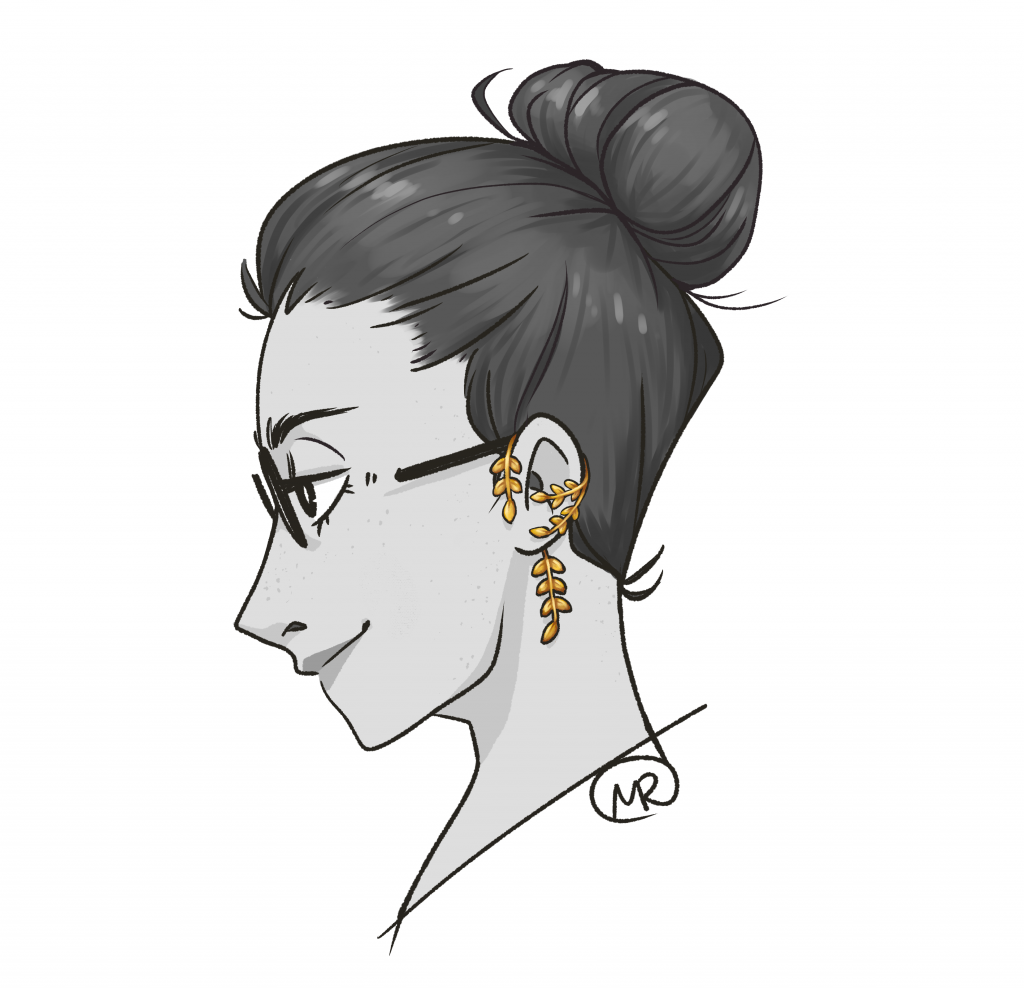edited by Ziv Wities
Every Friday night the angels came, and every Friday night they freaked me the fuck out. Which is probably why I didn’t get a million-eyed, one-footed guardian of my own like the rest of my family. This was totally fine with me. I was in no way jealous that my siblings had angels to accompany them to college while I was stuck sitting alone in an empty dorm room. Who needed a creep-tastic companion whose face consisted of a bizarro series of interlocking cogs and wheels forever whirring?
I was definitely not crying as I gripped my kiddush cup and sang Shalom Aleichem. The song, sung on faith in most Jewish households, welcomes home the invisible angels that accompany those returning from synagogue every Friday night. Except thanks to some particular genetic gift—or curse, I’m still not sure—my family could see them. Making it impossible for me to pretend that a whole host of angels was keeping me company.
You should go to the Hillel and hang out with actual people. That girl Mara who invited you after psych class seemed pretty nice.
The wine sloshed over my fingers as I jumped up, frantically searching for the origin of the disembodied comment. By some small miracle I’d been given a single as a freshman. A swift peek under the twin bed and a glance into the sorry excuse of a closet confirmed I was still the sole occupant.
Which meant that in addition to hiding the fact that I saw things others couldn’t, I was now going to have to hide the fact that I was having auditory hallucinations.
Or you could tell people. Maybe they’ll think it’s cool that you see angels. Like that woman on the talk shows.
My head nearly snapped on my neck as I twisted around the room. I definitely did not hallucinate that statement. I didn’t watch talk shows. “Who the fuck are you, and why are you messing with me?”
I began tearing the place apart, searching for a hidden transmitter or some piece of surveillance equipment left here by a previous occupant with a twisted sense of humor. Campus security had a lot of explaining to do.
“I hope you get expelled, you creepy-ass son of a bitch,” I muttered as I pried off the ceiling tiles.
Had I come here with my own guardian angel, they would have taken care of this for me. None of my siblings had to worry about illegal dorm room surveillance.
Wait. Hold up. You can hear me?
“Of course I can hear you, you perv. Now tell me who the fuck you are.” I had zero hopes of getting them to confess, but if I kept them talking I might be able to locate the source of the sound.
Uhm. I’m your guardian angel. Sorry it took me so long to figure out a way to communicate. Didn’t realize humans were set up for telepathy.
My head hit the ceiling and a rain of plaster paint chips littered my mattress. I let go of the ceiling and dropped down to the floor in a crouch like a feral cat.
“Spying is gross, but messing with my religion is crossing a line. I will find out who you are and I will end you.”
There was a scratchy sort of laughter that I still could not pin down to a location.
When you were ten your friends dared you to jump off the tire swing at summer camp. You should have fractured your ankle but you only sprained it. Because I caught you.
I blinked. It was true enough, but hospitals kept records. Computers were easily hacked. And more to the point: angels don’t speak, at least not any angel I ever met, and I’d met my fair share. “You’re going to have to do better than that.”
A sigh followed, pregnant with embarrassment.
You got your first period on a class trip to the Statue of Liberty. You were wearing a pair of white shorts. Luckily you found a pair of cut-offs and a maxi pad in your backpack. You’re welcome.
“Fuck.” I swallowed the kiddush wine in one gulp. The period fiasco was the most embarrassing story of my existence, a memory I did not dwell on often. I hadn’t even thanked my mother, who I had assumed packed the items, because that’s what mothers did. Wasn’t it?
Believe me now?
I nodded mutely and seized the wine, taking a swig straight from the bottle. Never before had I wished Manischewitz had a higher alcohol content. “So why can’t I see you?”
There was a cough but nothing else.
“You got a name?”
Still nothing.
This, unfortunately, also corroborated the whole telepathic angel story, because the celestial beings are also secretive bastards. They congregate very nicely amongst themselves from what I can tell, but God forbid they should ever communicate anything to a human straight out. For instance, my cousin Chana spent years wondering why her angel had a bare patch on its wings until her own alopecia showed up and her angel happily showed her that beauty did not have to take a standard form to be any less divine.
I set the bottle down. I did not like to think what my angel being invisible said about me.
“You got social anxiety too, or are you just trying to help me with mine?”
How about we hit up that Hillel and try talking to Mara? I think she likes you.
My reasons for wincing at the suggestion were fourfold. One, this non-answer was more than enough confirmation that my fear of social situations had turned my angel invisible. Two, Mara’s angel had been breathtakingly gorgeous. Three, Mara was even prettier than the angel, and I hadn’t managed to stutter out a single word when she invited me to join her at the campus Hillel for Friday night dinner. Four, my angel knew I was queer. A fact I had only recently acknowledged myself.
Well, that didn’t leave me much choice.
I grabbed my coat and fished the flier for the Hillel dinner out of my back pocket. Because there was no way in hell I was sitting here in this depressing-as-fuck dorm room, chatting about my newfound lesbianism with an angel that spoke directly into my head.
“I hope this makes you happy.”
Hell yeah! We’re going out!
***
I hated to admit it, but the Hillel crowd was pretty chill. An assistant Rabbi welcomed me at the door, handed me a prayer book, and then left me to my own devices for services. As soon as I selected a seat in the back of the sanctuary, Mara slid into the space next to me.
Her angel perched behind her, all statuesque six foot three of her. I knew she was a “her” because her molten gold cogs all whirred to the left, but everything else about her was entirely novel. Including her iridescent, rainbow feathers, a waterfall of sparkling colors. The urge to reach out and stroke one of the pastel plumes was so strong I sat on my hands.
Looking at Mara did not improve the situation. Her brown hair was held up in a ponytail, revealing a dusting of freckles across her nose and a pair of heavily lashed hazel eyes. She was freaking adorable and sitting so close I could smell her green apple body wash. Plus, she was whispering about how she thought our psych class should focus more on the ethical issues behind the classic experiments we were studying.
So basically, she was cute, outgoing and had a moral compass. I was so screwed. There was no way I could look at her or her ridiculously toned rainbow angel. Which left me staring numbly at my prayer book, for lack of other options.
Services were coming to an end and I hadn’t managed to say anything more than “Shabbat shalom” to Mara, who was now leading me like a stray puppy towards the rows of dinner tables. Apparently, she was a sophomore and on the Hillel board this year. Maybe she was associating with my lowly freshman self as some sort of outreach.
Or maybe she likes you.
I snorted. Of course, my angel decided to show up at the most inconvenient of times. Where had they been during services? There was so much I didn’t know. I couldn’t even see their cogs to figure out their gender.
“Is there… some kind of name I should call you, or something?”
Mara paused her chatter about Hillel activities to stare at me. Crap. In my confusion over my nameless angel, I’d forgotten to communicate using my brain and not my mouth.
Her freckled nose scrunched. “Just Mara is fine. I don’t have any nicknames. But I bet you do. Eleanor Elizabeth is kind of long.”
I cringed. Eleanor Elizabeth was the legal name my parents put on my birth certificate so that people wouldn’t stumble over the Hebrew name. Mara must have heard it during roll call, and I was too shitty a conversationalist to have thought to introduce myself.
“Eli,” I blurted out. “Short for Elisheva Leah.”
It was the longest string of words I’d put together in her presence, and to my extreme relief, she appeared to find this acceptable.
She handed me a small plastic shot glass full of kiddush wine as the Rabbi led the group of students in the usual Friday night songs.
“We’ll, I’m glad you came, Eli,” she said. “I was nervous you wouldn’t. Like maybe I was being annoying pressing that flier on you.”
I shook my head no so vehemently I almost spilled my glass. The fact that I had already downed half a bottle of Manischewitz in my room did not help matters. Fortunately, I was spared having to say anything by the start of Shalom Aleichem. Mara joined in the singing with gusto, her voice a powerful soprano that soared above all the others.
Holy shit, that girl can sing. Way better than you.
My angel began singing along, which was mildly preposterous given the song was supposed to be sung by the humans welcoming the angels and not vice versa, but I didn’t want to be a downer, so I chose to focus on Mara instead of commenting.
Her voice reached out to the far corners of the room and embraced every person in it, making them feel warm and invited. She should be recruitment chair. I would come back every week just to listen.
“You sing really well.” It was the dorkiest compliment known to humanity, and as a pick up line it left a lot to be desired, but I was proud of myself for speaking. Small victories and all that.
“Thanks,” Mara said, beaming at me. “I can’t resist a good harmony. Your angel has the most fantastic alto.”
What. The. Fuck.
What. The. Fuck.
I’m not sure who thought it first, but my angel and I were clearly in sync. I prepared to deny all knowledge of celestial beings and the angel at my side unleashed a string of curse words so extensive I began to wonder if they were the ghost of some long-dead drunken sailor rather than a holy messenger of God.
Mara was blushing through her freckles, her face so red it resembled the kiddush wine.
“I should not have said that.” She edged away from me. “I promise I am not hallucinating. It’s, like, a family thing. Never mind. Pretend I didn’t say anything.”
Which was exactly what I had been thinking back in my dorm room. I’d always wondered if there were other families that could see the angels. But I’d never thought to wonder if there were families that could hear them.
It was too enticing a possibility to pass up, so I decided to ignore my instincts, and the vehement protestations of my very own angel, screaming in my head that discoursing with Mara on the nature of angels would convince her I was having a mental breakdown. We were making inroads, having an actual conversation, and we’d somehow reached a point where talking about angels seemed the way to not scare her off.
“You can hear them?” I asked. “You would’ve come in handy when I was a kid. Because I can only see them. Except mine is invisible and we have to communicate telepathically.”
The last line was the Manischewitz talking, because while the first bit might have passed muster, nobody wanted to hang out with the chick that casually mentioned brain invasion at Friday night dinner before the challah had been passed around. Fuck.
“Oh my God.” Mara grabbed my hand and pulled me towards the back of the room. “I thought it was just my family. We all hear them. And it got so lonely when I came to college that I started coming to Hillel just to listen to everyone’s angels. Only yours has the most wonderful voice so I couldn’t help but approach you in class. I’m not usually that forward. Can you really not hear it?”
I shook my head no. “I can only see them. And, uhm, yours is really gorgeous. Which is why I’ve been having some trouble talking to you. It’s very distracting.”
So was the fact that Mara herself was very gorgeous, but given that she was staring at me like I had three heads, I decided to omit that part.
“What do you mean, ‘my angel’?”
I blinked at her, then shifted my eyes over to her angel, who was fluttering those glittered wings in my direction flirtatiously, as if acknowledging my compliment.
“You know,” I said. “The giant rainbow-winged girl with spheres within spheres for a face that is standing behind us, currently winking about half of her three hundred eyes at me?”
Mara shook her head. “One, is that what they really look like? And two, I don’t have an angel. I hear everyone else’s, but my entire life, not a single peep for me.”
There ensued a tremendous shuffling of wings and rolling of eyes from the angel. None of which I could interpret. I sat back, trying to figure out my next move. If Mara’s angel didn’t talk to her, how was I supposed to convince her that her angel existed? It was clearly frustrating them both. Not to mention completely messing with my ability to ascertain whether Mara was interested in dating girls. Or, you know, me.
Um. It’s because. Well. Her angel can’t talk. My angel’s fumbling thought hit me with the force of a tsunami, guilting me right out of the daydream in which Mara and I were a couple by the time midterms hit.
You have to help them, Elisheva.
God must have a seriously shitty sense of humor.
I peeked over at Mara, gauging how best to break the news before deciding to just go ahead and rip off the band-aid. “So, uhm, you kind of do have an angel. A really fantastic glitter- and rainbow-covered dream of an angel. Only you can’t hear her because she can’t speak to humans. She was born without that ability.”
“Shit.” Mara’s eyes tripled in size, like two hazel searchlights, before she blushed red again. “Not shit in a bad way. Shit in a ‘I am so excited, by the way what’s your name, and I do not care if you cannot talk, but please find a way to communicate with me’ kind of way.”
Her ponytail swished as she swung her head around searching for the angel. I risked touching her cheek to steer her in the direction of the extremely sheepish-looking angel who I swear might have been crying out of all her eyes.
Her name is Ora. Maybe we can get them in on this angel-to-human telepathy thing.
I suppose it worked for me and the invisible wonder. But it had taken ages for my angel to make that breakthrough, and I still had no idea how I was managing my half of it. Maybe my angel could teach Ora, but would I need to instruct Mara? Without knowing what I was doing? This sounded like a serious group undertaking, like we’d all need to spend a significant amount of time together. Which suited me just fine, but I didn’t want to force it on Mara, or Ora.
“Her name is Ora.” I said, feeling it was imperative to convey at least this much. “If you’re OK with me being around you a lot, then my angel can try and teach yours how to communicate with you telepathically. If she wants.”
I held up a hand as Mara opened her mouth, face so bright there was no doubt she was about to say yes. Better she should know what she was getting into.
“My angel is invisible because I have severe social anxiety. You don’t need to tell me why your angel can’t talk. I will never ask. I just wanted you to know that.”
Mara laughed, a sound like pure joy manifested. “Because it’s something nobody would know about her right away. Not even the other angels. Otherwise one of them would have told me before now. They just assumed we were getting along perfectly.” She reached under her shirt and slowly pulled out a little metal box.
“Just like you wouldn’t know I have diabetes, type 1,” she said. Her fingers traced the contours of the box before she spoke again. “This is my insulin pump. I’ve had it since I was five, and I’ve shown it to some friends, but with each new person that’s a choice I have to make. You never know what their reaction will be, so it takes a lot of trust. I am overjoyed with my angel and the fact that she trusts me enough to share with me right now. I am also thrilled to have a telepathy mentor with social anxiety and an angel who is apparently double-invisible. What’s your name, by the way?”
There was a sigh in my brain, and apparently Mara heard something too because her face balled up.
“Oh, I see.” She turned to me without preamble. “Your angel doesn’t technically have a name. They would very much like one, but they’ve been too afraid to appear before God for the naming ceremony. Much like you and your social anxiety, only for a different reason. They ask you to promise not to freak out.”
It must be something incredibly unique if they felt the need to go through Mara and not ask me themselves. Still, they were my angel and they put up with my crap on a daily basis. The least I could do was reciprocate. Plus, Ora was nodding at least three of her spheres towards me, the left tilt of their twirling speeding up in her excitement.
“I promise.”
No sooner had the words left my mouth than my angel appeared before me, and if I thought Ora was distinct, then my angel was something spectacular. They had wings buffed to a high gloss in a tiger stripe pattern and hundreds of eyes that weirdly resembled mine, but their cogs were a blur of motion. The spheres tilted right and left, diagonal, backwards, forwards, in a dizzying array of motion the likes of which had never graced any angel that I had ever met. It was always left for the females, right for the males. But mine was everything and nothing all at once.
Oh. Shit.
“You don’t have a name because you were afraid God would misgender you?”
They nodded again, hanging their ever-spinning head to the point where I wanted to rush over and hug them tight.
I hope you aren’t disappointed. Maybe you can give me a name instead.
“Are you fucking kidding me?” This time I did hug them, hoping the rest of the Hillel crowd was too focused on the Rabbi’s speech to notice the girl in the back grabbing onto thin air and bawling her eyes out.
“I am so not disappointed. Being assigned to you because we’re both queer is way better than being assigned to you because I have social anxiety.”
Mara perked up at the mention of me being queer, but I didn’t have time to dwell or freak out about it. I was too busy coming up with a name for my angel.
“I will obviously do a shittier job than God, but how about Simcha?” A name used for both Jewish boys and girls, and it literally translates to ‘joy’. “It makes me really happy knowing you’re there.”
I waited for a response but when none came I began to regret being so hasty. Did I fuck it up? Choose the wrong name?
“Simcha says to tell you they love it so much it is messing with their ability to telepathically communicate.” Mara was beaming over at the two of us. “Also, they are worried they may have outed you to me before you intended, which is causing them to be afraid to talk to you again, because they also share your social anxiety.”
Ora was rolling her eyes so hard I was afraid they’d fall out, turning her spheres in my direction and raising a wing to point at Mara before lifting two feathers. I was not yet fluent in angel charades, but the message came through loud enough.
And now it was my turn to worry I’d invaded someone’s privacy. Mara must have noticed my blush because she smiled at me. “I’m guessing my angel just informed you that I am a safe space and also very, very gay.”
I nodded.
“I am also single.”
“Oh.”
Tell her you were assigned a single dorm.
“What? No. Get your mind out of the gutter.” I turned to Mara. “I am so sorry if you heard that. Simcha and I need to have a chat about appropriate things to say to humans.”
“Perhaps Ora and I should go over that as well,” Mara said, nonplussed. “But maybe we sort it out after dinner? The food’s actually pretty good, and we already missed the fish and the soup. I’d hate to miss the kugel.”
“Sounds like a plan.”
Which is how I ended up escorting a smoking hot girl with type 1 diabetes, an angel that can’t speak, and a sometimes-invisible non-binary angel back to Friday night dinner at the campus Hillel.
I was still kind of freaked out. Except in a good way. Because it was becoming infinitely clear that I was no longer alone.
© 2023 by Y.M. Resnick
3769 words

Y.M. Resnik (she/her) is a scientist and writer from the NY area. While she loves creating new worlds and reimagining Jewish folklore, her main goal is simply to brighten your day with a story. Her work has appeared in Cast of Wonders, Worlds of Possibility, and We’re Here: The Best Queer Speculative Fiction of 2022. When not writing, she can be found collecting tiaras and trying not to kill her houseplants.
If you enjoyed the story you might also want to visit our Support Page, or read the other story offerings.









